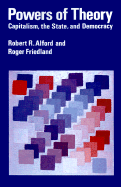Book contents
- Frontmatter
- Contents
- Preface
- Acknowledgments
- Introduction: State and society in theoretical perspective
- 1 Theoretical perspectives as modes of inquiry
- PART I THE PLURALIST PERSPECTIVE
- PART II THE MANAGERIAL PERSPECTIVE
- PART III THE CLASS PERSPECTIVE
- PART IV THEORY, POLITICS, AND CONTRADICTIONS IN THE STATE
- Glossary
- Bibliography
- Name index
- Subject index
1 - Theoretical perspectives as modes of inquiry
Published online by Cambridge University Press: 01 June 2011
- Frontmatter
- Contents
- Preface
- Acknowledgments
- Introduction: State and society in theoretical perspective
- 1 Theoretical perspectives as modes of inquiry
- PART I THE PLURALIST PERSPECTIVE
- PART II THE MANAGERIAL PERSPECTIVE
- PART III THE CLASS PERSPECTIVE
- PART IV THEORY, POLITICS, AND CONTRADICTIONS IN THE STATE
- Glossary
- Bibliography
- Name index
- Subject index
Summary
The home domain of each theoretical perspective comprises a particular level of analysis, world view, and method. In addition, each perspective has a distinctive view of key societal dimensions, the state, and its most important relations with society. Table 2 summarizes these elements of the mode of inquiry of each perspective. We shall show through detailed critical examination of actual empirical inquiries where the analysis is strong on a particular home domain and how it becomes weak when it leaves that domain without the appropriate conceptual adjustments.
Our own position is that individual interests, motivations, and perceptions can never adequately explain individual behavior. Both organizational and societal factors must be taken into account in explaining variations in rates of individual behavior occurring in different types of situations. But the reverse is not possible – one cannot explain organizational or societal processes by theories of individual behavior or social interaction. Nor can organizational relations explain the totality of social relations.
Levels of analysis
Each perspective distinguishes in its own way among three levels of analysis: individual, organizational, and societal. Each perspective regards one of the levels as central and interprets the other levels from the vantage point of that level. This is the limit of each perspective's powers, exercised in its home domain.
The societal level refers to the interinstitutional relations within and between whole societies. The concept of “institution” refers to a pattern of supraorganizational relations stable enough to be described – polity, family, economy, religion, culture.
- Type
- Chapter
- Information
- Powers of TheoryCapitalism, the State, and Democracy, pp. 15 - 32Publisher: Cambridge University PressPrint publication year: 1985

